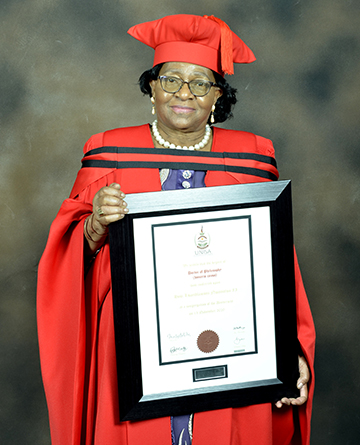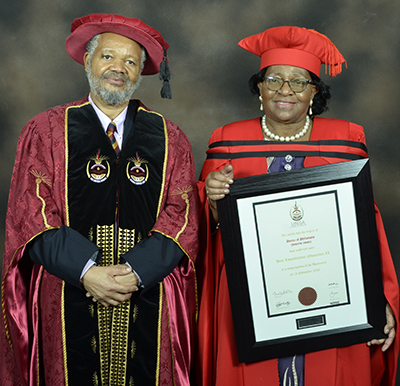

Hosi Lwandlamuni Nwamitwa II
“We would stand on the threshold of a new beginning as a country if we shake the foundation of patriarchy and gender-based violence by reconstructing the gender-justice paradigm and expand circles of relations in which women are empowered, affirmed, and celebrated.” This powerful statement was made during the acceptance speech of Hosi (Chief) Lwandlamuni Nwamitwa II, after her majesty received an honorary doctorate from Unisa.
The degree of Doctor of Laws (honoris causa) was conferred on the first appointed woman Hosi of the Valoyi tribe by Unisa’s Principal and Vice-Chancellor, Professor Mandla Makhanya, at a graduation ceremony on 13 November 2020.
In appreciating her honorary doctorate, Nwamitwa II said her academic studies did not prepare her for the struggle of gender justice, equality, and opportunities she was destined to confront in her later years. Nwamitwa II explained that the traditional setting, patriarchal power, and authority in which she was brought up dictated that the place of women and girls was in the kitchen—their divinely ordained predestination. “The truth be told, as the eldest daughter in the royal family, it was decreed that the place of royal leadership was dedicated only to men and not women,” she said.
“The shackles of patriarchal oppression were effectively broken down when I decided to challenge patriarchy by claiming my rightful place as an heir to the Valoyi royal throne as my father’s successor who had passed on many years ago. This reawakening and conscientiousness for gender justice and equality came about as a result of the political struggle for justice and gender equality.”
Nwamitwa II was born on 27 June 1940 as the only child of the late Hosi Fofoza and his principal wife Favasa nwa Manave. Her mother passed on when her daughter was 17 years old. Her doting grandmother, father, and aunt introduced her to cultural rituals and religious principles early in her life. At the age of seven, Nwamitwa II started school when girls were prevented from attending school. Her father, Hosi Fofoza insisted that his daughter be an exception to the rule and she became the first girl in her area to attend school at her age. This example was then followed by many parents in Nwamitwa and surrounding villages.

Prof Mandla Makhanya (Principal and VC, Unisa) and Hosi Lwandlamuni Nwamitwa II
As a leader, Nwamitwa II participated in the Convention for a Democratic South Africa (CODESA), the historic multiparty negotiations which ushered in the new democratic dispensation in 1994. Her commitment to the African National Congress (ANC) saw her serving as a member of the National Parliament from 1994 to 2014 under the first four presidents of the country, Nelson Mandela, Thabo Mbeki, Kgalema Motlanthe, and Jacob Zuma.
“Over the years, my mission has been the upliftment of women, in particular rural women, in my struggle to drive the transformation agenda. The exposure through participation in action, has taught me that education alone is not enough to change the oppressive human condition,” said Nwamitwa II.
She told the audience at the ZK Matthews Great Hall that it was a humbling privilege for her to be honoured by Unisa—“a university which is, to me, more than an ordinary academic institution. A university which is my alma mater, and which remains the theatre where I cut my proverbial academic teeth. Not only is this university my alma mater, she has produced a pool of alumni covering statesmen, outstanding academics, and administrators.”
Speaking confidently about the principles of transformation, Nwamitwa II declared that her situation was a testimony that traditions need not be cast in stone. “The fact that today, a woman leader stands before you as a royal leader of her people, supported by her royal family, her council, her community, and the laws of this country, is a testimony that our customs are not static. Our customs have a dual function of transforming society and of being recipients of our changing society, as alluded to by President Nelson Mandela. Our customs can be transformed, and any perception of equating them with backwardness, flies in the face of their ability to respond to contemporary challenges,” she affirmed.
“As I receive the honorary Doctor of Laws this evening, I do so in full recognition of the transformative route that this university stands for. I do so on behalf of the courageous women of our great country, who have made immense contributions in the liberation of our country, and without whose total liberation, our nation will be functioning at half capacity.”
*By Lesego Ravhudzulo, Journalist, Department of Institutional Advancement
Publish date: 2020-11-23 00:00:00.0